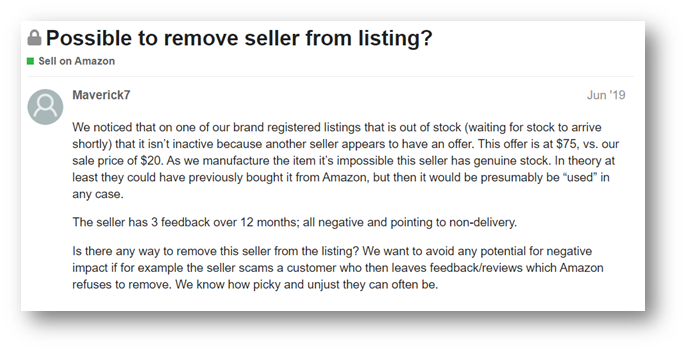Brand owners—did you hop onto Amazon with grand hopes of exponentially boosting your sales, making a massive splash in your respective industry, and simplifying your sales model (i.e. skip the middleman, leap over the brick-and-mortar sellers, etc.)? And has this effort proved just a bit more challenging than that “FAQ” page from Amazon made it sound? You’re not alone.
What Do Amazon and Walmart Do to Protect You?
Every day at Blue Wheel, I work with brands who, for better or worse, have taken part in the eCommerce or Amazon gold rush and are now trying to work almost backwards to protect their trademarks and other intellectual property given the global availability of their branded protects online. I am often asked “Won’t Amazon remove sellers if they are infringing on our trademark? We have Brand Registry!”
Especially in years past, brands hustled onto these online marketplaces—Ebay, Walmart, and, primarily, Amazon—to get a piece of the action. They wanted (and still want) to be a part of the enormous growth that is “eCommerce.” However, this gold rush has had a major act-now-learn-later component to it.
What do I mean? Well, surely, if you manage a brand that is sold on Amazon, you’ve encountered an issue with too many sellers on your product listing(s). You’re not sure who they are. You don’t know where they may have gotten the product. You may have even posted something similar to this in an Amazon seller forum:

But alas, despite the pages of “intellectual property policy information” and much to your surprise, no Amazon knight in shining armor came to your rescue. In fact, confoundingly, you may have received a response similar to this (below) from a fellow Amazon seller:

What? My listing may be taken down? (I explain below) But again, what do these massive online marketplaces actually do to protect your trademark? Not a whole lot. Well, let’s be fair: They don’t do much unless you are an absolutely mammoth name brand that can negotiate with Amazon to be a “gated” brand and/or are part of one of the marketplace’s curated collections—such as Amazon luxury beauty (for which the marketplace charges the brand additional fees and percentages per sale).
Walmart
If you dig into Walmart’s protections for brand sellers, you may get excited to learn that Walmart provides an “IP Claim Form” that anyone may complete and submit. Anecdotally, these requests do nothing—but don’t let us dissuade you from giving it the ol’ college try.
Keep reading, however, and you’ll at least understand why Walmart is hands-off:
“Note that Walmart does not mediate trademark disputes between third parties and trademark owners. Rather, Walmart will forward the trademark claim to the third party before taking any action, with the intent that the third party and trademark owner will resolve between themselves any dispute over ownership rights and infringement.”
Keep reading…
“Under the IP laws of the United States, rights owners may lose their rights to prevent the further sale of a product after the “first sale” by the manufacturer. Therefore, the enforcement of exclusive distribution agreements is a matter between the manufacturer and its retailers, and Walmart will not take action to enforce such agreements.
It would be much more efficient if their IP policy simply read, “FIGURE IT OUT ON YOUR OWN.” Still, you see the explanation provided highlights that the First Sale Doctrine generally provides protection for resellers selling trademarked products, and it is up to the brand itself to understand the issue, create enforceable agreements to overcome the First Sale Doctrine, and enforce its policies against resellers.
Amazon
To Amazon’s credit, it has implemented its Brand Registry program that provides some minimal level of assistance in managing your brand’s trademarks on the marketplace. That said, both the cover of the First Sale Doctrine (explained above) and the sheer volume of products, listings, brands, and complaints combine to render Brand Registry mostly futile.
If you read through Amazon’s Intellectual Policy for Sellers, it primarily reads like a “what-to-do-if-a-brand-tells-you-that-you’re-infringing guide” as opposed to a “how-we-protect-your-IP guide.” Additionally, Amazon’s position is similar to Walmart’s: Enforce your trademark and policies through your own brand’s agreements, because the only way we’ll take down sellers is if they have clearly counterfeit products and/or there are countless complaints fielded from many brands on that particular seller and they don’t have legitimate responses.
Click on the “FAQ about Trademarks” link and you’ll see that there is a reminder to sellers that they are generally free to use trademarks in the resale of products:

Remember our seller post above? I promised I would explain how your branded listing could be removed if you tried to report a rogue seller: If you are filing complaints about a seller and that seller is aware of his/her rights under the First Sale Doctrine (which many now are), that seller can and often will turn right around and file complaints against you stating that you are harassing them, that you are interfering with their business operations, etc. If Amazon and its robots agree with that rogue seller and your brand has no enforceable reseller program in place to overcome the First Sale Doctrine and have the seller legally removed, the result of the matter will just blow with the wind—your guess is as good as mine, and, yes, Amazon could kick you off your own listing.
The overarching point is this: If you are relying on Amazon and/or Walmart to be your selling police on the marketplaces, your brand will only further drive into a downward spiral in terms of both pricing and brand appearance.
An enforceable reseller program that address online selling, pricing, and brand/product characteristics combined with the tools needed to monitor and enforce such a program is the only effective approach to protecting your brand online.
Reach out to us to learn more about brand protection.







.png)
.png)
.avif)